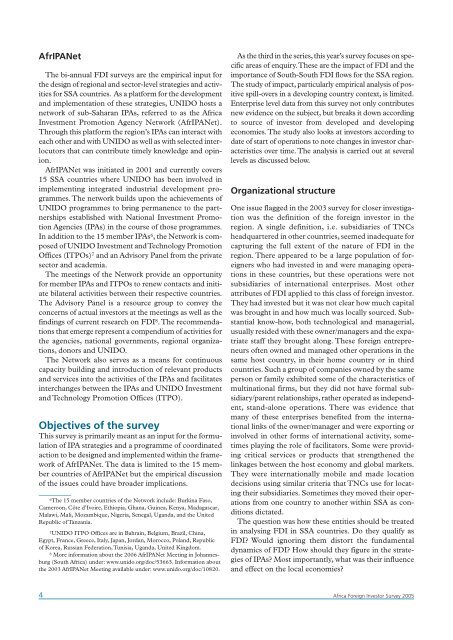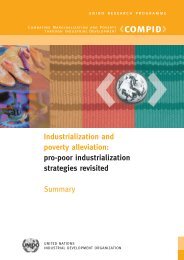Africa Foreign Investor Survey 2005 - unido
Africa Foreign Investor Survey 2005 - unido
Africa Foreign Investor Survey 2005 - unido
You also want an ePaper? Increase the reach of your titles
YUMPU automatically turns print PDFs into web optimized ePapers that Google loves.
AfrIPANet<br />
The bi-annual FDI surveys are the empirical input for<br />
the design of regional and sector-level strategies and activities<br />
for SSA countries. As a platform for the development<br />
and implementation of these strategies, UNIDO hosts a<br />
network of sub-Saharan IPAs, referred to as the <strong>Africa</strong><br />
Investment Promotion Agency Network (AfrIPANet).<br />
Through this platform the region’s IPAs can interact with<br />
each other and with UNIDO as well as with selected interlocutors<br />
that can contribute timely knowledge and opinion.<br />
AfrIPANet was initiated in 2001 and currently covers<br />
15 SSA countries where UNIDO has been involved in<br />
implementing integrated industrial development programmes.<br />
The network builds upon the achievements of<br />
UNIDO programmes to bring permanence to the partnerships<br />
established with National Investment Promotion<br />
Agencies (IPAs) in the course of those programmes.<br />
In addition to the 15 member IPAs 6 , the Network is composed<br />
of UNIDO Investment and Technology Promotion<br />
Offices (ITPOs) 7 and an Advisory Panel from the private<br />
sector and academia.<br />
The meetings of the Network provide an opportunity<br />
for member IPAs and ITPOs to renew contacts and initiate<br />
bilateral activities between their respective countries.<br />
The Advisory Panel is a resource group to convey the<br />
concerns of actual investors at the meetings as well as the<br />
findings of current research on FDI 8 .The recommendations<br />
that emerge represent a compendium of activities for<br />
the agencies, national governments, regional organizations,<br />
donors and UNIDO.<br />
The Network also serves as a means for continuous<br />
capacity building and introduction of relevant products<br />
and services into the activities of the IPAs and facilitates<br />
interchanges between the IPAs and UNIDO Investment<br />
and Technology Promotion Offices (ITPO).<br />
Objectives of the survey<br />
This survey is primarily meant as an input for the formulation<br />
of IPA strategies and a programme of coordinated<br />
action to be designed and implemented within the framework<br />
of AfrIPANet. The data is limited to the 15 member<br />
countries of AfrIPANet but the empirical discussion<br />
of the issues could have broader implications.<br />
6 The 15 member countries of the Network include: Burkina Faso,<br />
Cameroon, Côte d’Ivoire, Ethiopia, Ghana, Guinea, Kenya, Madagascar,<br />
Malawi, Mali, Mozambique, Nigeria, Senegal, Uganda, and the United<br />
Republic of Tanzania.<br />
7 UNIDO ITPO Offices are in Bahrain, Belgium, Brazil, China,<br />
Egypt, France, Greece, Italy, Japan, Jordan, Morocco, Poland, Republic<br />
of Korea, Russian Federation,Tunisia, Uganda, United Kingdom.<br />
8 More information about the 2006 AfrIPANet Meeting in Johannesburg<br />
(South <strong>Africa</strong>) under: www.<strong>unido</strong>.org/doc/53663. Information about<br />
the 2003 AfrIPANet Meeting available under: www.<strong>unido</strong>.org/doc/10820.<br />
As the third in the series, this year’s survey focuses on specific<br />
areas of enquiry.These are the impact of FDI and the<br />
importance of South-South FDI flows for the SSA region.<br />
The study of impact, particularly empirical analysis of positive<br />
spill-overs in a developing country context, is limited.<br />
Enterprise level data from this survey not only contributes<br />
new evidence on the subject, but breaks it down according<br />
to source of investor from developed and developing<br />
economies. The study also looks at investors according to<br />
date of start of operations to note changes in investor characteristics<br />
over time. The analysis is carried out at several<br />
levels as discussed below.<br />
Organizational structure<br />
One issue flagged in the 2003 survey for closer investigation<br />
was the definition of the foreign investor in the<br />
region. A single definition, i.e. subsidiaries of TNCs<br />
headquartered in other countries, seemed inadequate for<br />
capturing the full extent of the nature of FDI in the<br />
region. There appeared to be a large population of foreigners<br />
who had invested in and were managing operations<br />
in these countries, but these operations were not<br />
subsidiaries of international enterprises. Most other<br />
attributes of FDI applied to this class of foreign investor.<br />
They had invested but it was not clear how much capital<br />
was brought in and how much was locally sourced. Substantial<br />
know-how, both technological and managerial,<br />
usually resided with these owner/managers and the expatriate<br />
staff they brought along. These foreign entrepreneurs<br />
often owned and managed other operations in the<br />
same host country, in their home country or in third<br />
countries. Such a group of companies owned by the same<br />
person or family exhibited some of the characteristics of<br />
multinational firms, but they did not have formal subsidiary/parent<br />
relationships, rather operated as independent,<br />
stand-alone operations. There was evidence that<br />
many of these enterprises benefited from the international<br />
links of the owner/manager and were exporting or<br />
involved in other forms of international activity, sometimes<br />
playing the role of facilitators. Some were providing<br />
critical services or products that strengthened the<br />
linkages between the host economy and global markets.<br />
They were internationally mobile and made location<br />
decisions using similar criteria that TNCs use for locating<br />
their subsidiaries. Sometimes they moved their operations<br />
from one country to another within SSA as conditions<br />
dictated.<br />
The question was how these entities should be treated<br />
in analysing FDI in SSA countries. Do they qualify as<br />
FDI? Would ignoring them distort the fundamental<br />
dynamics of FDI? How should they figure in the strategies<br />
of IPAs? Most importantly, what was their influence<br />
and effect on the local economies?<br />
4 <strong>Africa</strong> <strong>Foreign</strong> <strong>Investor</strong> <strong>Survey</strong> <strong>2005</strong>
















